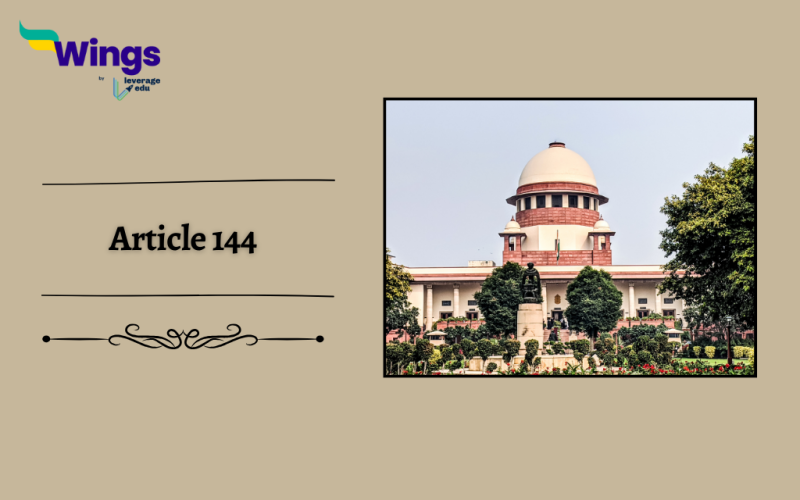Article 144 of the Indian Constitution under Part V (The Union) Chapter 4- Union Judiciary states that both Civil and Judicial authorities within the territory of India are obligated to support and assist the Supreme Court. Simply put, all governmental bodies and legal entities, as well as people in India, are obligated to assist and uphold the functioning of the Supreme Court. Additionally, it addresses that all authorities must act under the orders of the Supreme Court.
Also Read: Important Articles in Indian Constitution
What is the History of Article 144?
Table of Contents
Initially, in the draft of the Constitution of India, in 1948 Article 144 was Article 120. Which was then debated in the Constituent Assembly on the 27th of May, 1949. Furthermore, it stated clearly that all civil authorities must act to aid the Supreme Court. Article 120 was adopted on the very same day. Later, in 1950 when the Indian Constitution was completed, Draft Article 120 became Article 144.
Also Read: Power and Functions of the Indian Judiciary
Additionally, Civic Authorities that need to follow Article 144 are as follows:
| Civic Authorities to follow Article 144 | |
| All India Civil Services | Indian Administrative Service (IAS) |
| Indian Police Service (IPS) | |
| Indian Forest Service (IFoS) | |
| Group ‘A’ Civil Services | Indian Foreign Service (IFS) |
| Indian Audit and Accounts Service (IAAS) | |
| Indian Civil Accounts Service (ICAS) | |
| Indian Defence Accounts Service (IDAS) | |
| Indian Corporate Law Service (ICLS) | |
| Indian Defence Estates Service (IDES) | |
| Indian Ordnance Factories Service (IOFS) | |
| Indian Information Service (IIS) | |
| Indian Postal Service (IPoS) | |
| Indian Communication Finance Service (ICFS) | |
| Indian Railway Account Service (IRAS) | |
| Indian Railway Traffic Service (IRTS) | |
| Indian Railway Personnel Service (IRPS) | |
| Indian Revenue Service (IRS) | |
| Railway Protection Force (RPF) | |
| Indian Trade Service (ITS) | |
| Group ‘B’ Civil Services | Armed Forces Headquarters Civil Service |
| Pondicherry Police Service | |
| Pondicherry Civil Service | |
| Delhi, Andaman and Nicobar Islands Police Service (DANIPS) | |
| Delhi, Andaman and Nicobar Island Civil Services (DANICS) | |
Furthermore, the Judicial Authorities that need to follow Article 144 are as follows:
| Judicial Authorities to follow Article 144 |
| Chief Justice of India (CJI) |
| Chief Justices of States (CJS) |
| Judicial Council |
| Any Court Arbitrator |
| Any Court Prosecutor |
| Tribunal (or any other similar body) |
| Special Master |
| Any judge presiding over a court or any governmental body with the authority to exercise judicial powers or functions of any nature is considered a judicial authority. |
What is an Example of Article 144?
If the Supreme Court of India issues a ruling to a State government. In which they urge specific actions to preserve the environment. As per Article 144 of the Constitution of Inda, all Civil authorities within that State which includes the State Pollution Control Board as well as municipal corporations. Moreover, they are legally obligated to follow and support the implementation of what the Supreme Court has asked of them. Likewise, if Judicial authorities are given the task of implementing a judgment by the Supreme Court, all local courts must also partake.
Also Read: 42nd Amendment
What is the Difference Between Section 144 and Article 144?
Section 144 is a provision under the Code of Criminal Procedure (CrPC) in India. It authorises a magistrate, a District Collector, or a Commissioner of Police to issue orders to prohibit the assembly of four or more people in a specific area. In addition, this is typically done to prevent disturbances of public peace and tranquillity.
On the other hand, Article 144 of the Consitution of India states that both Civil and Judicial authorities within the territory of India are bound to help and assist the Supreme Court of India. This means that any order by the Supreme Court needs to be followed as well as respected by all.
Also Read: Making of the Constitution
Lastly, we hope you liked our blog and gained an understanding of Article 144 of the Indian Constitution. Moreover, you may even read more blogs and empower yourself with knowledge regarding Civics and Polity!
 One app for all your study abroad needs
One app for all your study abroad needs













